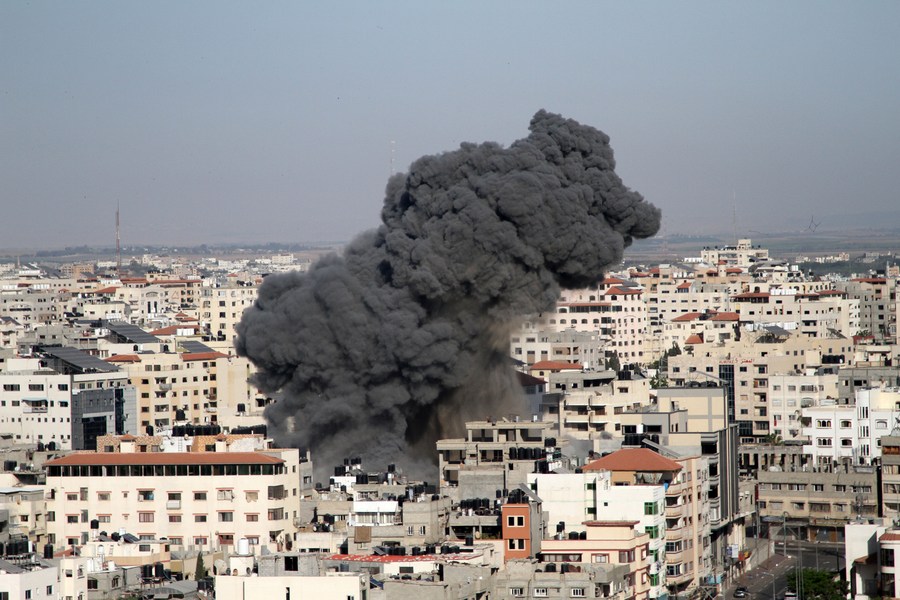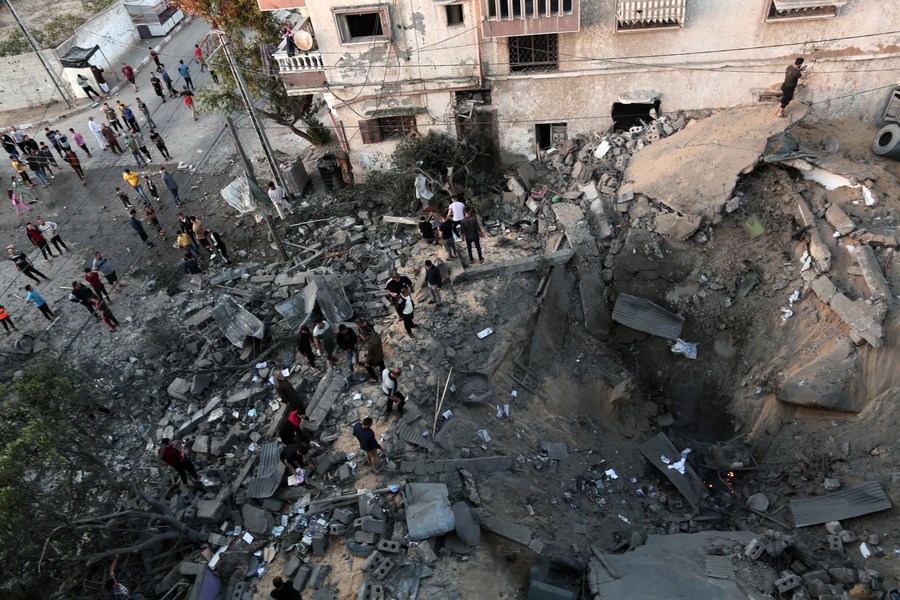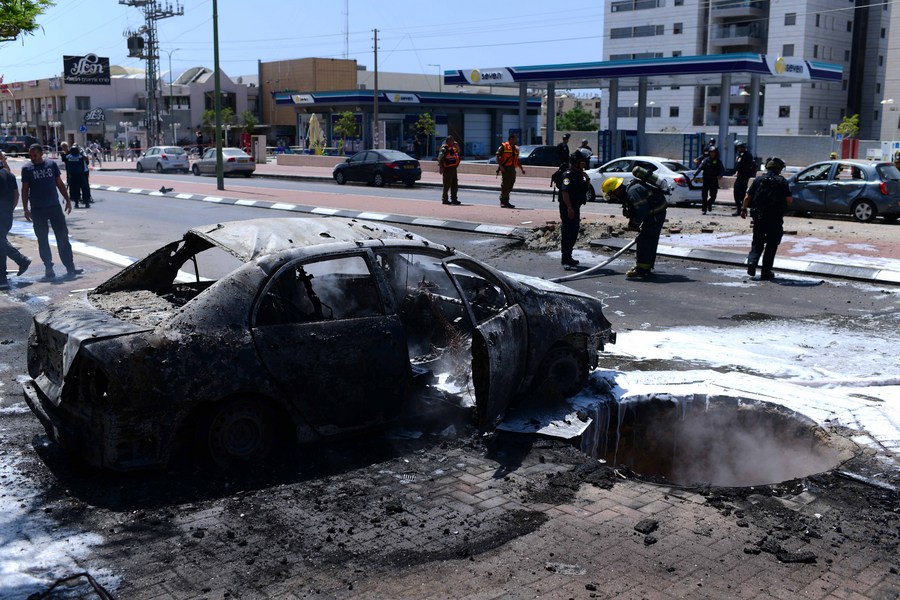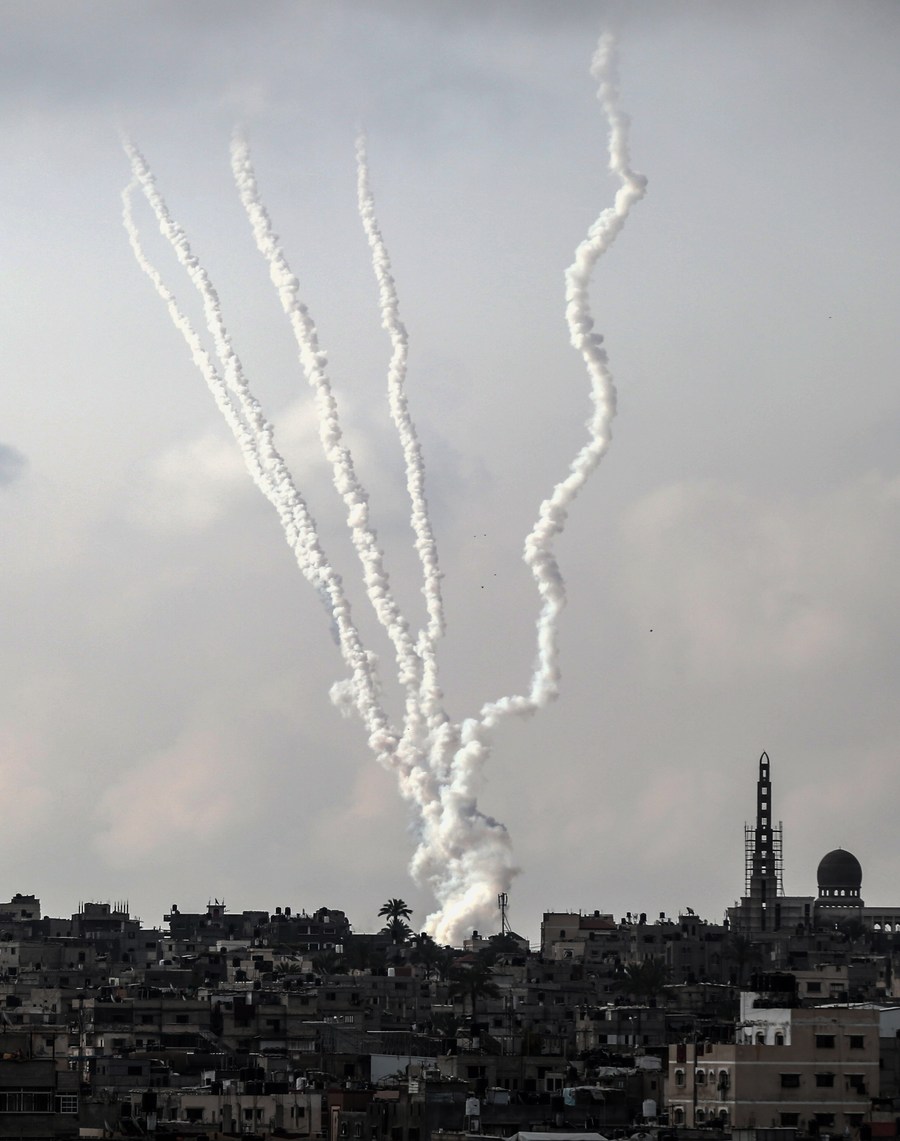-- Conflict in East Jerusalem during the past four weeks between Palestinian worshippers and Israeli police has ignited the current wave of violence. The outrage reached its climax when Israel decided to evict Palestinian families from their homes in Sheikh Jarrah neighborhood in the city.
-- Analysts have warned that it could trigger an all-out war with high cost and sink the world, already besieged by a ravaging pandemic and sluggish economy, into greater instability and vulnerability.
-- Tala Oukal, a Gaza-based political analyst, told Xinhua that there is "no doubt that Israel is to be blamed for causing the current escalation because it attacked worshippers during the Muslim fasting month of Ramadan and forced Palestinian families to evacuate their homes."
by Saud Abu Ramadan, Emad Drimly
GAZA, May 15 (Xinhua) -- Over the past six days, armed conflict between Israel and the Hamas-led militant groups has kept flaring up, marking the fiercest fighting between the two sides since 2014 that has killed more than 120 Palestinians and nearly 10 Israelis.
The two sides continue a tit-for-tat exchange of fire and keep trading threats of escalation, while regional and international mediation efforts have produced little effect to defuse the spiraling tensions.

Photo taken on May 14, 2021 shows explosions following Israeli air strikes on a bank that belongs to Hamas in Gaza City. (Photo by Rizek Abdeljawad/Xinhua)
At present, the international community remains gravely concerned about whether Israel will launch a ground offensive against the Islamic Hamas movement, which is in control of the Gaza Strip.
Analysts have warned that it could trigger an all-out war with high cost and sink the world, already besieged by a ravaging pandemic and sluggish economy, into greater instability and vulnerability.
SPIRAL OF ARMED VIOLENCE
On Saturday, Israel deployed more tanks and ground forces on the borders with the Gaza Strip, after Israeli Defense Minister Benny Gantz ordered a redeployment of more reinforcements to the border areas.
Conflict in East Jerusalem during the past four weeks between Palestinian worshippers and Israeli police has ignited the current wave of violence. The outrage reached its climax when Israel decided to evict Palestinian families from their homes in Sheikh Jarrah neighborhood in the city.
The sharp escalation began at 6 p.m. local time (1500 GMT) on May 10, after Hamas set an ultimatum for Israel to withdraw its forces from the Al-Aqsa Mosque compound, where hundreds of Palestinians were injured in clashes with Israeli police earlier that day.

Palestinians inspect the rubble of a house destroyed by Israeli airstrikes in the southern Gaza Strip city of Khan Younis, on May 14, 2021. (Photo by Yasser Qudih/Xinhua)
Overnight and at predawn on Friday, Israeli fighter jets kept striking the Gaza Strip and bombarded a five-storey building in western Gaza City, which included a branch of a Hamas bank, according to an Israeli military spokesperson.
The Israeli army also said the Israeli forces had intensively attacked posts that belong to Hamas, adding that 160 war jets, artillery, and tanks participated in the military operation.
It added that 150 targets were hit overnight and on Friday morning, and many of the targets were underground. The Israeli army will also continue its strikes on the militants who fire rockets at Israel, it said.
Three rockets were fired on Friday night from Syria toward northern Israel, said the Israeli military, adding one rocket fell short within Syria and the other two fell in an open field, causing no damage or injury.
Hamas and Islamic Jihad militants have also announced that their militants have fired more barrages of rockets into Israel.
Al-Qassam Brigades, Hamas' armed wing, claimed responsibility for launching 100 rockets at the Israeli city of Ashkelon, in response to Israel's "targeting of civilians" in the enclave.
Al-Quds Brigades, the armed wing of Islamic Jihad, also said that its militants carried out intensive rocket strikes at Israeli cities in southern and central Israel.
UN URGES UNIFIED MEDIATION
United Nations (UN) Secretary-General Antonio Guterres on Friday called for a unified Security Council over the Israeli-Palestinian conflict and regretted the lack of multilateralism.
Asked what the secretary-general expects from Sunday's emergency meeting of the Security Council on the ongoing Israeli-Palestinian escalation, Guterres' spokesman Stephane Dujarric said: "What we would like to see is ... a strong, unified voice for de-escalation, for a cessation of hostilities and a push to get the parties back on track to find a political solution to this conflict that has been going on and on and on."
Asked for Guterres' comment on the fact that one single Security Council member blocked the proposal for a Friday meeting on the Israeli-Palestinian conflict, just days after all council members pledged support for multilateralism, Dujarric said Guterres is concerned about the state of multilateralism "as we've seen it during the pandemic and as we've seen it in other aspects."

A burnt car is seen after a rocket from the Gaza Strip landed in southern Israeli city of Ashkelon, on May 11, 2021. (Tomer Neuberg/JINI via Xinhua)
China on Friday slammed the United States for compelling the UN Security Council to postpone a meeting on the Palestine-Israel issue that was originally scheduled to open on Friday.
Foreign Ministry spokesperson Hua Chunying told a daily news briefing that on Monday, the United States expressed opposition to the adoption of a Security Council presidential statement on the Palestine-Israel issue, and it also blocked the issuance of a statement from the UN Security Council on Wednesday expressing concern about the situation in Palestine.
Hua said that the United States has taken a position against the international community, and she asked the country to explain why it is doing this.
Hua noted that, in the face of the current serious situation, all sides must make every effort to cool the situation, protect the safety, rights and interests of ordinary people, and prevent the crisis from escalating and getting out of control.
Egyptian Foreign Minister Sameh Shoukry and his Jordanian counterpart Ayman Safadi discussed on Friday the deteriorating conflict in the Palestinian territories and stressed the necessity to resume the Israeli-Palestinian peace process.
During a phone conversation, both ministers stressed the importance of continuing the work on an immediate means to stop the conflict in the Gaza Strip and prevent any Israeli provocations in Jerusalem, the Egyptian Foreign Ministry said in a statement.
French President Emmanuel Macron on Friday also called on Israelis and Palestinians to stop hostilities and agree on a ceasefire.
"The spiral of violence in the Middle East must stop," Macron tweeted. "I strongly call for a ceasefire and for dialogue. I call for calm and peace."
HIGH COST OF GROUND OFFENSIVE
Adnan Abu Aamer, a Gaza political science professor who specializes in Israeli affairs, told Xinhua that the cost of launching an Israeli ground operation will be high for both Israel and the Palestinians.
"The ground operation will drag the two sides into a comprehensive war," said Abu Aamer. "I believe the Israeli threats to wage a ground operation against the Gaza Strip are part of a psychological war... It is only for show."
"The Israeli army knows well that a ground offensive would put its soldiers before three main options: first is to get killed; second is to get back home with physical disability, and third is to get captive in the hands of militants, which will be the hardest for Israel," he noted.

Photo taken on May 11, 2021 from the southern Gaza Strip city of Khan Younis shows rockets being fired toward Israel. (Photo by Yasser Qudih/Xinhua)
Echoing those perspectives, Husam al-Dajjani, a political analyst from Gaza, told Xinhua he ruled out that Israel would wage a massive ground military operation in the Gaza Strip, "because Israel will not be able to bear the cost of that in terms of human losses."
"Israel is boosting its military presence on the borders with Gaza to protect its towns and settlements adjacent to the Gaza Strip from possible Palestinian infiltration attacks," he said, adding that deploying more forces on the borders is meant to pressure the Palestinian factions for a ceasefire.
Al-Dajjani also said the Palestinian factions, including Hamas, are ready to reach a ceasefire and don't want to get involved in a large-scale confrontation with Israel.
Tala Oukal, a Gaza-based political analyst, told Xinhua that there is "no doubt that Israel is to be blamed for causing the current escalation because it attacked worshippers during the Muslim fasting month of Ramadan and forced Palestinian families to evacuate their homes."
"Israel made a mistake when it believed Hamas and other factions would keep silent and stand watching the Israeli violations against al-Aqsa Mosque and the Muslim worshippers," Oukal said. "Hamas is ready to cease fire, but it wants to stop Israel from carrying out more violations in Jerusalem." (Video reporters: Xiong Sihao, Sanaa Kamal, Khader Abu Kwik; Video editors: Zhao Yuchao, Luo Chen)■




